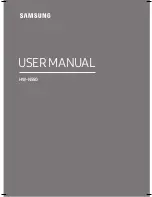
46
aDock and aDock A/V Adaptor Connections
1. Connect the DB15 cable that is attached to the
aDock
to the
aDock A/V Adaptor
as shown
in
Figure 11.
This will provide power and control to the iPod and send A/V signals and
metadata to the AVR21EN.
2. Connect a DB9 cable from the
aDock A/V Adaptor
to the
Disc 3 DVD Changer Interface
Terminal [circle 34]
on the AVR21EN Rear Panel as shown in
Figure 11.
This will provide
control to the iPod and send A/V signals and metadata to the AVR21EN.
NOTE: With the two above connections, the AVR21EN will ‘autodiscover’ the iPod and
automatically configure the AVR21EN, KP21 Keypads and KP21R Multiroom Remotes with the
appropriate control commands for iPod. The KP21 Keypads will also automatically display the
proper graphics for iPod Menu Navigation, Control and Metadata.
3. Connect the included 12VDC Power Supply to the
aDock A/V Adaptor
and plug it into an
unswitched AC Outlet after all system connections have been made and confirmed. This will
provide power for the A/V Adaptor, the aDock and the iPod.
Audio – Disc 3 (iPod)
1. Connect the L&R line level audio outputs on the
aDock A/V Adaptor
to the
Disc 1 L&R IN
Jacks [circle 1]
on the AVR rear panel.
Video – Disc 3 (iPod)
1. Connect the composite video OUT on the
aDock A/V Adaptor
to the Disc 1 C-Video IN on
the AVR rear panel.
VR (Video Recorder)
Audio IN - VR
1. Connect the L&R line level audio outputs of a Video Recorder (VCR, TiVo or DVD-R) to the
VR L&R IN [circle 4]
jacks on the AVR rear panel.
Audio OUT - VR
1. Connect
the
VR L&R OUT [circle 5]
jacks on the AVR rear panel to the L&R line level audio
inputs (record) on a Video Recorder.
Video IN - VR
NOTE 1: It is not necessary to connect both Composite and S-Video. It is necessary to have a
composite video connection to distribute video to the AVH21 Hubs in Multiroom applications. The
Video Source Outputs [circle 37]
(multiroom video out) cannot accept component inputs, nor
are component inputs down-converted for use with these outputs.
NOTE 2: Video will default to the highest quality signal available.
NOTE 3: When a source is connected to the AVR21EN via component video connections, it is
also necessary to connect the composite and/or S-Video outputs of the source device to the
AVR21EN if you wish to take advantage of the record outputs. The record outputs cannot accept
component inputs, nor are component inputs down-converted for use with these outputs.
1. Connect the composite video output of a Video Recorder to the
VR C-VID IN [circle 4]
jack
on the AVR rear panel.
2. Connect the S-Video output of a DVD/CD player to the
VR S-VID IN [circle 4]
jack on the
AVR rear panel.
Video OUT - VR
1. Connect
the
VR C-VID OUT [circle 5]
jack on the AVR rear panel to the Composite Video IN
(record) jack on a Video Recorder.
2. Connect
the
VR S-VID OUT [circle 5]
jack on the AVR rear panel to the S-Video IN (record)
jack on a Video Recorder.
SPF (Power Management – Optional) - VR
NOTE: An SPF (Source Power Flag) should be used on any device that does not have discreet
IR ON/OFF codes. Composite Video should be sensed for a Video Recorder. All SPF modules
can be daisy-chained together for power from a single SPF/PS power supply and must be
powered to work. (See section:
SPF Features
)
Composite Video
Summary of Contents for AVR21EN
Page 1: ...1 INSTALLATION INSTRUCTIONS...
Page 41: ...41 AVR21ENR1 FUNCTION LIST Figure 8 AVR21ENR1 Button Locations...
Page 156: ...156 KP21R ZONE REMOTE FUNCTION LIST Figure 84 KP21R Button Locations...
Page 159: ...159 Figure 86 Typical Three Zone System...
Page 161: ...161 Figure 87 Typical Hub System...
Page 164: ...164 Figure 90 Multiple Hub Power Connections...
















































